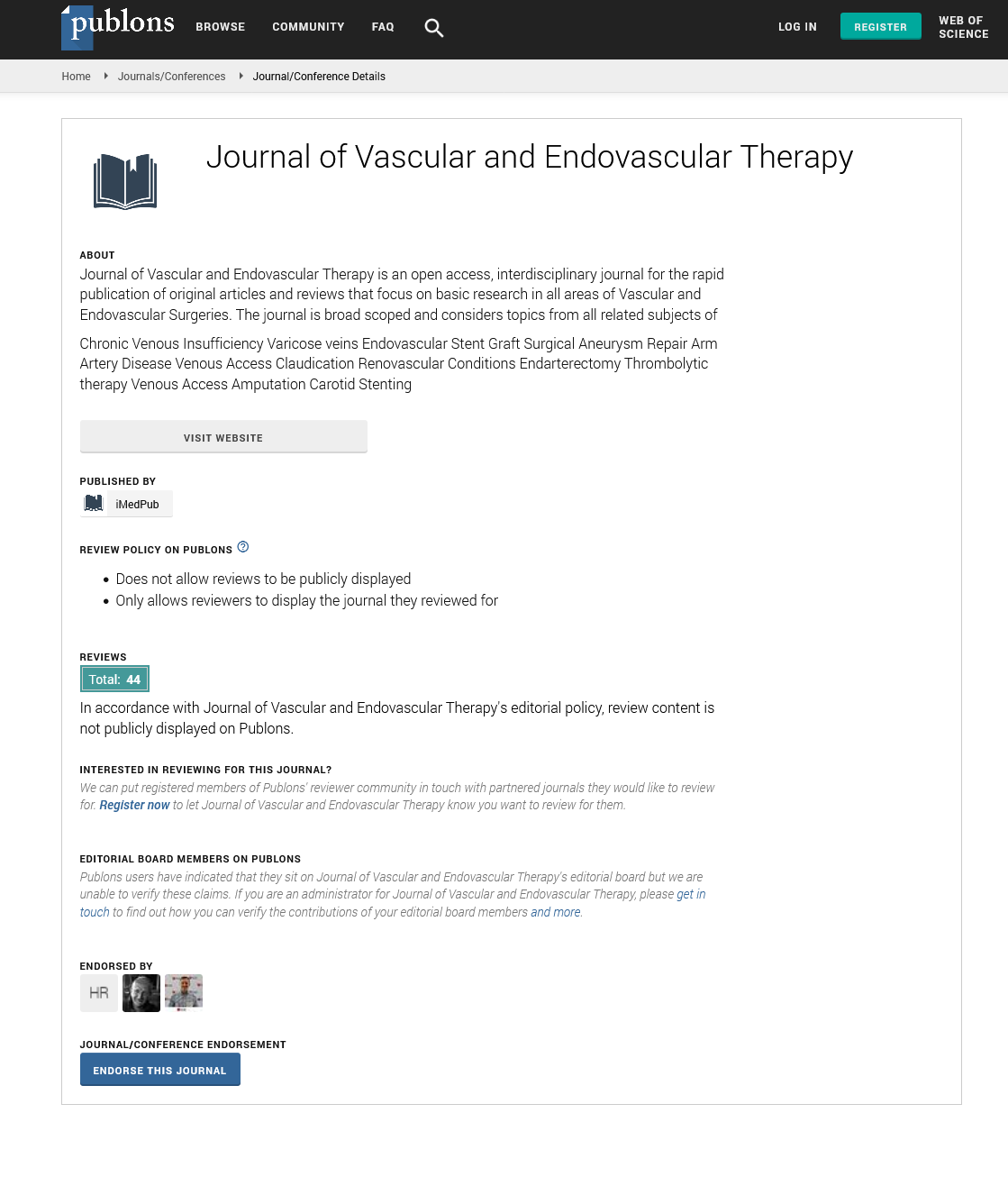ISSN : 2634-7156
Journal of Vascular and Endovascular Therapy
Endovascular treatment of peripheral arterial disease in 2018: Which technology to use, and why
3rd Edition of World Congress & Exhibition on Vascular Surgery
May 24-25, 2018 London, UK
Martin A Funovics
Medical University of Vienna, Austria
ScientificTracks Abstracts: J Vasc Endovasc Therapy
DOI: 10.21767/2573-4482-C1-002
Abstract
BACKGROUND: The endovascular treatment of peripheral arterial occlusive disease (PAOD) has undergone rapid evolution during the last years, characterized by the availability of a plethora of new devices and techniques that make an increasing number of lesions (technically) amenable to an “endo-first” approach. The interventionalist is now confronted with a multitude od options to cross and treat a lesion, but surprisingly little scientific evidence exists as to which method should be preferred over another, and in which lesion. For example, the notion that primary nitinol stents are superior to balloon angioplasty is based solely on three RCTs, the superiority of drug eluting stent over bare stent on a subgroup in one RCT, and the difference between drug-eluting balloons and nitinol stenting has never been addressed in an RCT. LEARNING OBJECTIVES: This course will provide an overview of available endovascular techniques, including balloon angioplasty, bare stent implantation, stentgrafts, drug-eluting balloons, and drug-eluting stents. Region by region, the available literature concerning experience, expected primary patencies, and comparisons (where available) between the available methods will be appraised. Questions for which evidence is urgently needed but not available will be defined. For each region, a decision tree based upon the available evidence will be drafted and opened for discussion. The following techniques will be covered: • Balloon angioplasty • Bare nitinol stents • Drug-eluting stents • Sentgrafts • Drug-eluting balloons
Recent Publications 1. Self-expanding nitinol stents of high versus low chronic outward force in de novo femoropopliteal occlusive arterial lesions (BIOFLEX-COF trial): study protocol for a randomized controlled trial. Wressnegger A, Kaider A, Funovics MA. Trials. 2017 Dec 14;18(1):594. doi: 10.1186/s13063-017-2338-0. 2. Paclitaxel-Eluting Balloon Versus Standard Balloon Angioplasty in In-Stent Restenosis of the Superficial Femoral and Proximal Popliteal Artery: 1-Year Results of the PACUBA Trial. Kinstner CM, Lammer J, WillfortEhringer A, Matzek W, Gschwandtner M, Javor D, Funovics M, Schoder M, Koppensteiner R, Loewe C, Ristl R, Wolf F. JACC Cardiovasc Interv. 2016 Jul 11;9(13):1386-92. doi: 10.1016/j.jcin.2016.04.012. 3. Treatment of the aorto-iliac segment in complex lower extremity arterial occlusive disease. Wressnegger A, Kinstner C, Funovics M. J Cardiovasc Surg (Torino). 2015 Feb;56(1):73-9. Epub 2014 Dec 5. 4. Endovascular repair of thoracoabdominal aortic aneurysms with a novel multibranch stent-graft design: preliminary experience. Kinstner C, Teufelsbauer H, Neumayer C, Domenig C, Wressnegger A, Wolf F, Funovics M. J Cardiovasc Surg (Torino). 2014 Aug;55(4):543-50. Epub 2014 Jul 10. 5. [Endovascular interventions for multiple trauma]. Kinstner C, Funovics M. Radiologe. 2014 Sep;54(9):8939. doi: 10.1007/s00117-013-2638-7. German
Biography
Martin Funovics is an interventional radiologist and has been working in all fields of endovascular treatment and oncologic IR for over 20 years. He has authored over 90 peer-reviewed publications both in clinical IR as well as in basic research in vascular and tumor biology. He has co-developed novel stent graft designs for aortic repair and performed several first-in-man procedures of novel devices. He is PI of the first (ongoing) RCT assessing chronic outward force between different nitinol stents in peripheral arterial disease.
Email:martin.funovics@meduniwien.ac.at
Google Scholar citation report
Citations : 177
Journal of Vascular and Endovascular Therapy received 177 citations as per Google Scholar report
Journal of Vascular and Endovascular Therapy peer review process verified at publons
Abstracted/Indexed in
- Google Scholar
- Open J Gate
- Publons
- Geneva Foundation for Medical Education and Research
- Secret Search Engine Labs
Open Access Journals
- Aquaculture & Veterinary Science
- Chemistry & Chemical Sciences
- Clinical Sciences
- Engineering
- General Science
- Genetics & Molecular Biology
- Health Care & Nursing
- Immunology & Microbiology
- Materials Science
- Mathematics & Physics
- Medical Sciences
- Neurology & Psychiatry
- Oncology & Cancer Science
- Pharmaceutical Sciences
